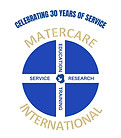GHANA

MaterCare International (MCI) is pleased to announce the completion of its maternal health projects in Ghana, west Africa. MCI was invited to Ghana by the late Bishop James Owusu, Bishop of Sunyani and Chair of the Health Care Commission for the Ghanaian Conference of Bishops, in 1995 to help with the development of programs to reduce the tragically high levels of maternal mortality and morbidity and to treat mothers suffering from obstetric fistula.
Project Completion
In 1997 MCI developed a model of rural essential maternity care around a mission hospital in the diocese of Sunyani. The model included prevention programmes funded by the Canadian International Development Agency and MaterCare International. The model included the training of village traditional birth attendants in safe clean delivery as well as recognition and referral of high risk mothers to hospital using a pictorial antenatal card; the training of nurse/midwives in 11 maternity centres to use the labour partograph as a visual aid in monitoring the labour progress; an emergency obstetric transport system with blood transfusion capability to safely transport mothers with complications to district hospitals, all linked by radio.
A research programme was completed which evaluated a new oral, effective and inexpensive method of managing life threatening postpartum haemorrhage. Peer reviewed and published in leading journals and at medical meetings, this project resulted in an increased number of mothers referred to the hospital and thus has reduced the number of deaths and birth injury. It has also proved to be sustainable and easily transportable to any rural area of poverty and poor communications.
At the same time, the curative care fistula hospital project was being developed in the Archdiocese of Cape Coast. The Fistula Hospital was built to provide women with obstetric fistula with corrective surgery and treatment. It will also act as a training centre for local doctors and nurses in the surgery and nursing management of fistula patients. MCI has contributed over US$450,000 to its construction and equipping with donations from the Italian Bishops Conference, Ireland Aid, the UK, the States of Guernsey, foundations, women's groups, parishes and individual donors. Recently, the Fistula Hospital was turned over to the Archdiocese of Cape Coast and the Board of Trustees.
"The Archdiocese of Cape Coast chooses to accept full responsibility for the fistula hospital, for its establishment, its operation and meeting whatever commitments have been given to donors as a condition to the receipt of funds."
The Board of Trustees will establish a date for the grand opening of the hospital in the near future.
Now an accredited non-government organisation with the United Nations, MCI has matured and learned with these projects, becoming internationally recognised through various awards for excellence. MCI is currently developing similar projects in Rwanda and Kenya.
